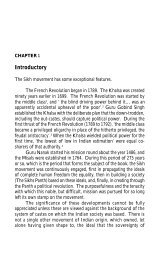Fundamentalism and the Sikh Religious Tradition by T.N. Madan
Fundamentalism and the Sikh Religious Tradition by T.N. Madan
Fundamentalism and the Sikh Religious Tradition by T.N. Madan
Create successful ePaper yourself
Turn your PDF publications into a flip-book with our unique Google optimized e-Paper software.
Centre could not constitutionally take control or make an enactment in that regard. Hence<br />
<strong>the</strong> invalidity of <strong>the</strong> Reorganisation Act <strong>and</strong> all <strong>the</strong> Central decisions about Punjab rivers.<br />
But, in 1980, Prime Minister Indira G<strong>and</strong>hi returned to power. She dismissed <strong>the</strong> Punjab<br />
Ministry, got signed an out-of-court agreement among <strong>the</strong> Congress Chief Minister of<br />
Punjab, Rajasthan <strong>and</strong> Haryana, <strong>and</strong> <strong>the</strong> case filed in <strong>the</strong> Supreme court, withdrawn. The<br />
agreement virtually endorsed <strong>the</strong> award of <strong>the</strong> Prime Minister given earlier.<br />
There are two o<strong>the</strong>r related events, which also suggest that <strong>the</strong> Centre was very<br />
vigilant that <strong>the</strong> constitutional issue about Rajasthan <strong>and</strong> Haryana being non-riparian, <strong>and</strong><br />
<strong>the</strong> Reorganisation Act being ultra vires, of <strong>the</strong> Constitution, should never be raised<br />
before <strong>the</strong> Supreme Court. One was <strong>the</strong> immediate shifting of Chief Justice, S.S.<br />
S<strong>and</strong>hanwalia, of Punjab <strong>and</strong> Haryana High Court, as soon as <strong>the</strong> Chief Justice had<br />
constituted a full Bench for hearing <strong>the</strong> water issue <strong>and</strong> as a result <strong>the</strong> transfer to Delhi of<br />
private petitions that had questioned <strong>the</strong> vires of <strong>the</strong> Punjab Reorganisation Act, <strong>the</strong>re<strong>by</strong><br />
virtually frustrating ano<strong>the</strong>r attempt to obtain a Judicial decision. The second was an<br />
extra-judicial agreement of 1984 about hydel power, made <strong>by</strong> <strong>the</strong> Punjab Governor with<br />
Congress Chief Ministers of Haryana <strong>and</strong> Rajasthan, eliminating <strong>the</strong> possibility of <strong>the</strong><br />
issue concerning hydel power <strong>and</strong> <strong>the</strong> vires of <strong>the</strong> Reorganisation Act being raised in <strong>the</strong><br />
Supreme Court.<br />
All this suggests that <strong>the</strong> Centre was conscious <strong>and</strong> feared that <strong>the</strong> constitutional<br />
verdict of <strong>the</strong> Supreme Court regarding <strong>the</strong> Punjab waters, would be against it, <strong>and</strong> it was<br />
very vigilant to ensure that such an eventuality did not occur.<br />
The Riparian Law, Constitutional Rights And Practices<br />
Under <strong>the</strong> age old International Law <strong>and</strong> practice it is accepted that where a river<br />
lies wholly within <strong>the</strong> territory of one state, it entirely belongs to <strong>the</strong> state, <strong>and</strong> no o<strong>the</strong>r<br />
state has any rights <strong>the</strong>rein. Thus, according to authorities like Berber, Heffer, Stark,<br />
Samisonian <strong>and</strong> o<strong>the</strong>rs disputes relating to river waters can only be between riparian<br />
states <strong>and</strong> not between a riparian state <strong>and</strong> a non-riparian state. In short, river <strong>and</strong> river<br />
waters which flow on l<strong>and</strong> are an essential part of l<strong>and</strong> or territory of a state, which has<br />
absolute rights <strong>the</strong>rein. For, territory constitutes an integral attribute of a state. Here it is<br />
necessary to indicate that <strong>the</strong> word state for <strong>the</strong> purpose of this right includes a state or a<br />
province within a country. This riparian principle st<strong>and</strong>s embodied in <strong>the</strong> Indian<br />
Constitution <strong>and</strong> vide entry 17 of <strong>the</strong> list to 7th Schedule of <strong>the</strong> Constitution, Rivers,<br />
River Waters <strong>and</strong> Hydel power have exclusively been kept as state subjects. The entry<br />
reads ;<br />
"17- Waters, that is to say, water supplies, irrigation <strong>and</strong> canals drainage <strong>and</strong><br />
embankments, water storage <strong>and</strong> water power subject to <strong>the</strong> provisions of Entry 56 of<br />
List I."<br />
Entry 56 of List I of <strong>the</strong> 7th Schedule reads;<br />
"56 - Regulation <strong>and</strong> Development of Interstate rivers <strong>and</strong> river valleys to <strong>the</strong><br />
extent to which such regulation <strong>and</strong> development under <strong>the</strong> control of <strong>the</strong> Union, is<br />
declared-<strong>by</strong> <strong>the</strong> Parliament to be expedient in <strong>the</strong> public interest."<br />
Fur<strong>the</strong>r, regarding a river <strong>the</strong> state has full <strong>and</strong> exclusive legislative <strong>and</strong><br />
executive powers under Articles 246(3) <strong>and</strong> 162 of <strong>the</strong> Indian Constitution. Entry 56 <strong>and</strong><br />
Article 262 mentioned above give authority to Parliament to legislate only in regard to<br />
interstate rivers <strong>and</strong> not in regard to water of a state river over which <strong>the</strong> concerned state<br />
alone has full, exclusive <strong>and</strong> final authority. A river valley is "a tract of l<strong>and</strong> lying
















